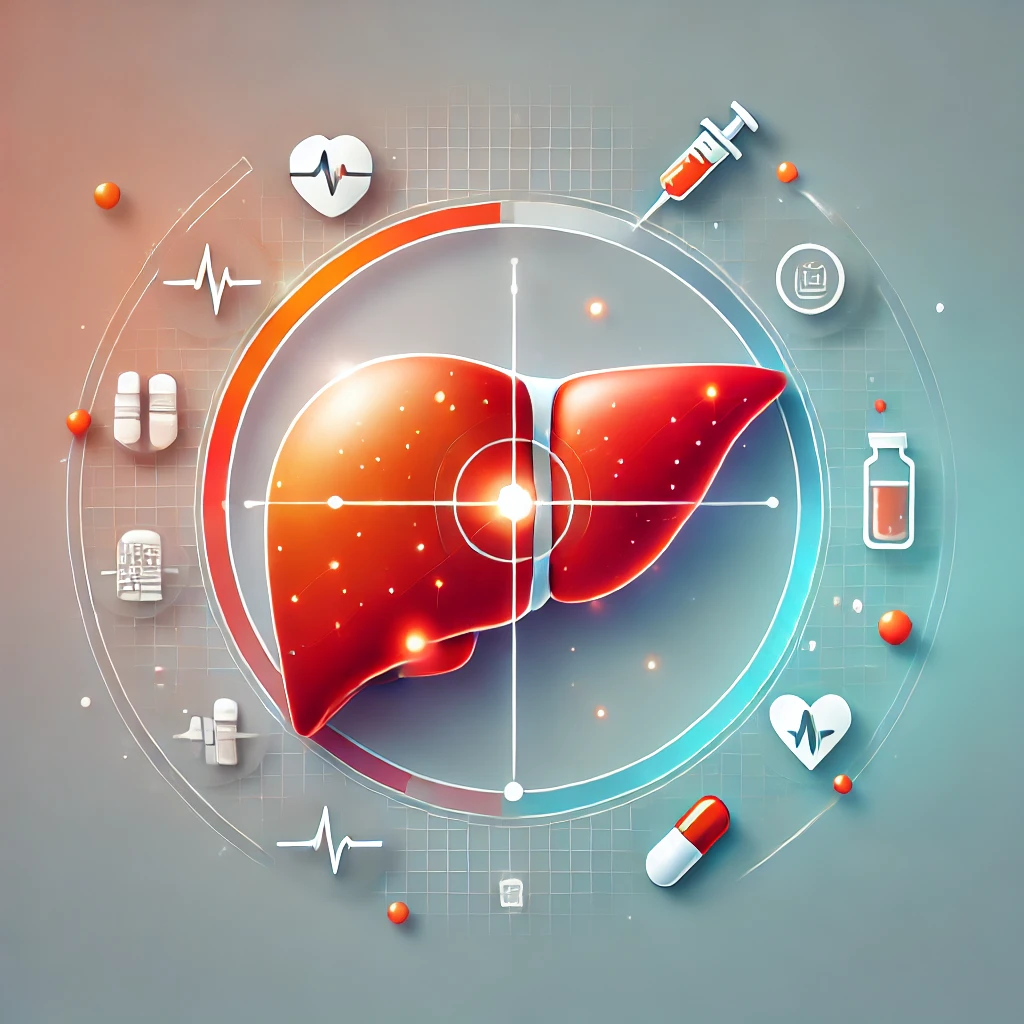Our Services
- Diabetes Mellitus
- Hypertension
- Osteoporosis
- Inflammatory Bowel Diseases
- Hypothyroidism and Endocrine Diseases
- Chronic Respiratory Diseases
- Chronic Neurological Diseases
- Chronic Liver Diseases
- Chronic Kidney Diseases
- Cardiovascular Diseases
- Arthritis and Rheumatic Diseases
- Confidential STD Testing & Treatment
- Women’s Health Screenings
- Men’s Health Screenings
- Obesity
- Vitamin Infusions
- Weight Management

Chronic Liver Diseases
Chronic liver diseases involve long-term liver damage that can lead to scarring (fibrosis), loss of function, and severe complications. Common causes include cirrhosis, chronic hepatitis (B and C), and alcohol-related liver disease.
At our clinic, we focus on early diagnosis, symptom management, and prevention strategies to slow disease progression and avoid severe liver complications.
Types of Chronic Liver Diseases
1. Cirrhosis
- A progressive scarring of liver tissue due to prolonged damage.
- Causes: Chronic alcohol use, viral hepatitis, fatty liver disease.
- Symptoms: Jaundice, fluid retention, weight loss, fatigue.
- Complications: Liver failure, portal hypertension, liver cancer.
2. Chronic Hepatitis (Hepatitis B & C)
- Viral infections that cause long-term liver inflammation and damage.
- Symptoms: Fatigue, jaundice, dark urine, joint pain.
- Treatment: Antiviral medications to control viral replication.
- Complications: Cirrhosis, liver cancer, liver failure.
3. Alcohol-Related Liver Disease (ARLD)
- Liver inflammation and scarring caused by excessive alcohol consumption.
- Symptoms: Nausea, abdominal pain, swelling, mental confusion.
- Treatment: Alcohol cessation, nutritional therapy, liver function monitoring.
4. Non-Alcoholic Fatty Liver Disease (NAFLD)
- Fat accumulation in the liver not related to alcohol.
- Risk factors: Obesity, diabetes, high cholesterol.
- Complications: Can progress to cirrhosis and liver failure.
5. Autoimmune & Genetic Liver Diseases
- Autoimmune Hepatitis: The immune system attacks liver cells.
- Hemochromatosis: Excess iron buildup damages the liver.
- Wilson’s Disease: Copper accumulation causes liver toxicity.
Symptoms of Chronic Liver Disease
Symptoms may vary but often include:
- Fatigue & weakness.
- Jaundice (yellowing of skin and eyes).
- Abdominal pain & swelling.
- Loss of appetite & weight loss.
- Dark urine & pale stools.
- Mental confusion (hepatic encephalopathy in advanced cases).
Chronic Liver Disease Management & Treatment
1. Early Diagnosis & Monitoring
- Blood tests (Liver Function Tests – LFTs) to assess enzyme levels.
- Viral screenings for hepatitis B & C.
- Ultrasound & Fibroscan to detect liver scarring.
- Liver biopsy (if needed) for detailed assessment.
2. Medication & Medical Management
- Antiviral therapy for hepatitis B & C.
- Corticosteroids & immunosuppressants for autoimmune hepatitis.
- Diuretics to reduce fluid retention in cirrhosis.
- Liver support medications to manage symptoms.
3. Nutritional & Lifestyle Adjustments
- Avoid alcohol to prevent further liver damage.
- Follow a liver-friendly diet (low fat, high in fruits & vegetables).
- Maintain a healthy weight to prevent fatty liver disease.
- Increase hydration and reduce salt intake.
4. Advanced Treatment Options
- Liver transplant for end-stage liver disease.
- Endoscopic procedures to treat varices (internal bleeding risk).
- Cancer screenings for cirrhosis-related liver cancer risks.
Complications of Untreated Liver Disease
Without proper management, chronic liver diseases can lead to:
- Liver failure requiring urgent transplantation.
- Hepatic encephalopathy (toxin buildup affecting brain function).
- Esophageal varices (internal bleeding from swollen veins).
- Increased risk of liver cancer (hepatocellular carcinoma).
- Severe malnutrition & immune system weakness.
Advantage Liver Care
We offer a comprehensive liver health program, including:
✅ Regular liver function monitoring & early detection.
✅ Personalized treatment plans for viral & metabolic liver diseases.
✅ Nutritional guidance & lifestyle modifications.
✅ Advanced medication management for symptom relief.
✅ Specialist collaboration for liver transplant & advanced therapies.


Health Tips & Info
- Limit alcohol intake and avoid excessive medications that harm the liver.
- Get vaccinated for hepatitis A & B to prevent infections.
- Eat a balanced diet rich in antioxidants and fiber.
- Exercise regularly to reduce fat accumulation in the liver.
- Schedule routine liver check-ups for early disease detection.